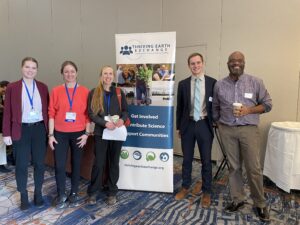NNC Community Science Hub with AGU Thriving Earth Exchange: Focus on Flooding
As an AGU Thriving Earth Exchange Community Science Hub, Nurture Nature Center is seeking twelve communities from across the US to join a new cohort of communities interested in advancing their priorities related to flooding impacts in partnership with volunteer scientists.
Communities selected for the cohort will work directly with a Community Science Fellow (volunteer project manager) and scientists to design and launch a project that unites community and science to advance community priorities. The program is free of charge for communities, and projects do not need external funding (some small seed funding may be available through AGU to support the work). Project managers help define the project priorities and secure volunteer scientists or technical experts to achieve community-led solutions.
AGU Thriving Earth Exchange is a non-profit program that helps communities and community leads work with science and scientists to advance their community priorities related to sustainability, environmental justice, resilience, natural hazards, natural resources, climate change and pollution to develop tools and solutions that are feasible and impactful in those communities.
NNC is working closely with AGU Thriving Earth Exchange to adapt the community science approach and materials to serve the priorities of marginalized and underserved communities and provide these resources and approaches for communities vulnerable to flooding.
If you are a community interested in participating please reach out! We’d love to talk with you. You can email Kate ksemmens@nurturenature.org for more information.
You can also find out more details and an application at https://thrivingearthexchange.org/community-applications/
We are looking for 5-6 communities to apply by March 27th for the May 2024 Cohort! There will also be the opportunity to apply by August 1st for the September 2024 Cohort.
The AGU Thriving Earth Exchange Community Science Hub initiative is generously funded by the Gordon and Betty Moore Foundation.


